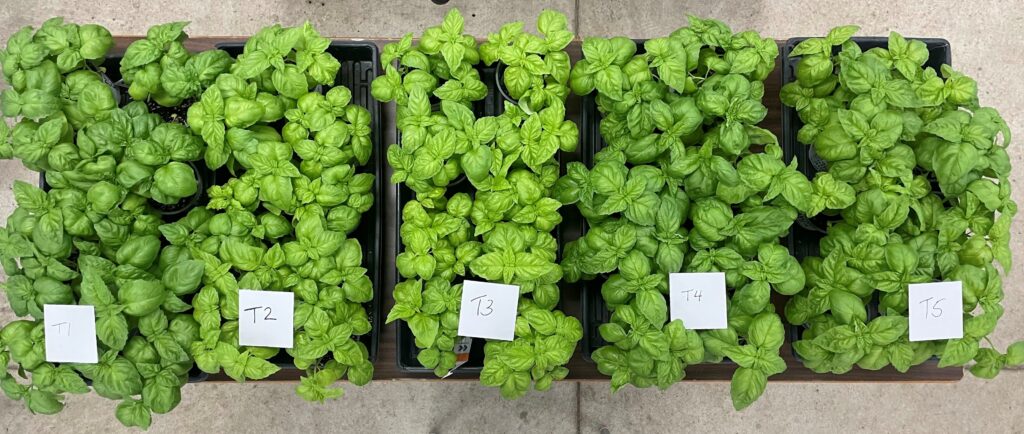Challenge: Examine the effects of anovel, vermichar amendment technology in supporting plant growth and health Solution: Test the technology under controlled growing conditions with a leafy green and a fruiting crop Impact: Growth of basil and strawberry plants in media amended with vermichar, fertigated with compost tea, outperformed commercially available media with soluble chemical fertilizer
Terra Optima Labs Inc. (Terra Optima) has created a circular system which can divert food wastes from landfills and process it into natural soil amendments, fertilizers, and food, using natural organisms. Terra Optima utilizes composting worms that consume food waste and produce a valuable manure output called castings, which has the potential to be used as a natural soil amendment.
The objective of this trial was to examine the effects of a novel soil amendment, a type of vermichar produced by Terra Optima, on the growth and health of leafy green and fruiting crops. At the end of the trial completed by HESIC, it revealed that Terra Optima’s new vermichar technology was the top performer when compared against other soluble chemical fertilizers. The growth of both basil and strawberry in media amended with 10% vermichar, fertigated with compost tea, outperformed the commercially available media fertigated with soluble chemical fertilizers.
Based in London, Ont. at the Western Fair District, Terra Optima has created a novel vermichar product; a blend of worm castings and biochar aimed to stabilize and capture nutrients released from the worm castings, as well as improve the beneficial microbial habitat. Terra Optima currently doesn’t possess the knowledge or have access to controlled environment crop growth to perform reliable growth trials to gain knowledge on their product’s efficacy on plant growth.
They therefore turned to the Horticultural & Environmental Sciences Innovation (HESIC) team to help them run reliable growth trials. The effect of Terra Optima’s vermichar on plant growth was tested at different volumes as a media amendment (0%, 10%, and 20%), in addition to being used as a starter for compost tea. Ocimum basilicum (Basil) and Fragaria x ananassa (strawberry) crops were grown in five treatments containing vermichar and/or compost tea, or neither (‘control’).

Results of this trial show that 10% vermichar by volume incorporated into media produced significant benefits for both crops when fertigated with compost tea. Of all treatments with vermichar, basil was the tallest, most green, and produced the highest overall amount of biomass in the 10% vermichar blend fertigated with compost tea.
The height and leaf colour of this treatment was similar to the control, however the 10% vermichar and compost tea treatment surpassed the control in the amount of overall basil produced by weight, by an increase of 20%. In the strawberry crop, when compared to the control, the 10% vermichar with compost tea treatment-initiated flower production 5 days earlier, produced nearly 2/3 more harvestable fruit, and averaged 1.5% higher in total soluble solids (TSS, °Brix). The growth of both basil and strawberry in media amended with 10% vermichar, fertigated with compost tea, outperformed the commercially available media fertigated with soluble chemical fertilizers.
Will Wang, Co-founder of Terra Optima Labs, knew after he met HESIC team members at a cannabis conference in London, Ontario, that they were the experts who could carry out their research project successfully. “Terra Optima Labs approached HESIC because of their expertise in conducting comprehensive plant growth trials which fulfilled all our desired research requirements (and more),” he noted.
“We were able to gain access to experts in horticulture and research who designed and executed growth trials to a degree which we could not do in-house. HESIC’s greenhouse is a great asset to provide a controlled environment to conduct trials year-round,” he added.
For the industry partner, an important piece of this research is knowing that there is real impact in the results. “The results validated the great effects of our product which we have received from customers reviews and demonstrated in-house. The results also helped determine future product development pathways that we could further invest in,” Will said.
This project was made possible by funding from the Federal Economic Development Agency for Southern Ontario, through the Niagara College-led Greenhouse Technology Network.

